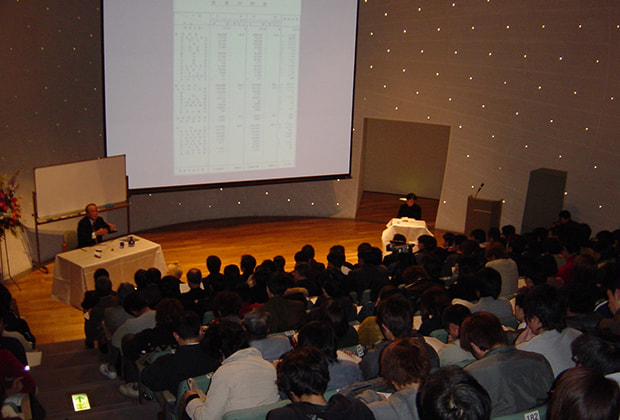Lectures
Reflections on "Kazuo Inamori's Practical Studies" ― Seeking the essence of things by adhering to fundamental principles ―

Reflecting on his own practical experiences, Inamori compiled his thoughts on management and accounting into a book titled Kazuo Inamori's Practical Study: Management and Accounting, which was published in 1998. This section introduces content from lectures Inamori gave to students on various topics from the book. The lectures were presented as part of the Kyocera Management Studies, an endowed course at Inamori's alma mater, Kagoshima University.
This lecture is included in the book Selected Lectures on Management, by Kazuo Inamori, Vol. 4: Management Techniques for Thriving Companies.
Can one lead a business without understanding accounting?
As students, amid daily life, you need to be aware of the balance or imbalance of money that comes in and money that goes out. You need to ensure that income covers expenses. Achieving a balance of money received and money spent is just as important in managing a company. In government agencies also, it is important to know how much money comes in, how much is spent on public projects, and how to make ends meet. From households to enterprises to entire nations, in all cases, accounting is indispensable for achieving a balance between income and expense.
Many executives within large enterprises in Japan approach management without understanding the accounts. Fundamentally, though, the person at the top must understand the accounts. Within today's complex global economy, it is essential that we grasp the state of the business accurately and make sure-footed management decisions. To do this, we must be well-versed in accounting principles and processes.
The concepts behind my accounting method
When I founded Kyocera, I was just a 27-year-old engineer with no management experience. I did not know the first thing about 'accounting.' Yet I was the person everyone looked to for decisions on all kinds of company matters.
On what basis should I make decisions? How should I approach management? These questions put me in a state of anxiety that kept me awake at night. However, on thinking about it, I began to see that the business could not possibly do well if my actions in management were irrational or contrary to basic morality and ethics. I therefore decided to make all decisions in the light of fundamental rules and principles. I would strive to confront each new issue that arose from a thorough understanding. In determining to take this path in all aspects of management, I began to reconsider what management should be. I deliberated constantly about the essence of management.
The exact same thinking applied to accounting. I was constantly thinking about the essence of accounting. Whenever my expectations differed from the numbers in the actual accounts, I immediately had the person in charge of accounting give me a detailed explanation. I did not want a textbook-style reply. I wanted answers relating to the true nature of accounting and the principles it reflected. The person in charge of accounting was often unable to give that kind of response, so I just kept asking questions until I was convinced.
In the process of Kyocera's growth and development, I encountered continual problems relating to accounting and taxation. I tackled each one directly, based on my personal management philosophy. Eventually, I arrived at a way of thinking that I considered reasonable, concerning the state of accounting and finances, the ideal form of management accounting, and so on. That way of thinking permeated the company alongside the management control system I began to refer to as Amoeba Management.
My foundation for accounting: "Adhere to fundamental rules and principles"
Accounts and accounting should be at the heart of business management. However, you should not simply follow the conventional wisdom that states, "Accounting is always done this way." Gaining understanding of what is going on, based on the fundamental principle of what is right, is extremely important. For example, even if the government decides something, you should always try to acquire a full understanding and allow yourself to be convinced, or not, based on the essence of what is right.
Let us consider a case in keeping with fundamental rules and principles in the field of accounting. This example concerns the useful lifetime of a fixed asset for depreciation purposes.
In depreciation, the number of years over which a machine, a fixed asset, should function normally is set as the "useful lifetime." The cost of the machine is materialized, or "depreciated," over that number of years. In common accounting practice, the machine is depreciated in accordance with the statutory useful number of years set by the government. However, with machinery and facilities used for manufacturing ceramics, the actual useful lifetime may be only five or six years, whereas the statutory requirements dictate they should be depreciated over 12 years. Now, the statutory useful lifetime, or number of years, is set according to tax law, which emphasizes fair taxation. This sometimes leads to a distortion of fundamental principles stating that depreciation expense should be charged to accounts only over the period for which the asset functions normally. I do not follow the statutory useful number of years in this case. Instead, I follow the principle of depreciating the asset over the actual period during which it functions normally, even if it means paying additional tax through the taxable depreciation method.
In management, you must look for the essence of matters in accordance with fundamental rules and principles. I call this "Adherence to fundamental rules and principles." It is part of my nature to thoroughly examine the essence of things. I think this is why I was able to work a little more effectively than other people in research and engineering. When learning about accounting, I was constantly asking "Why?", just as I did in research and development.
Decision-making criteria should transcend common sense

I can cite many examples that show the extent to which a person's mind can be ruled by common sense or general convention.
Once, "compensating balances" were widespread. Every time a company discounted its promissory notes with a bank, they deposited a certain rate, accumulating it in the bank. This acted as a risk hedge for the bank in case of a note default. However, these deposits just kept accumulating, never being freed even if they surpassed the discounted note balance. I voiced my disagreement with this in meetings. Although my stance was ridiculed as extremely unconventional, the practice was later abolished, revealing that it was just a ruse to boost the bank's real income. No matter how much something is touted as "conventional," if it seems irrational, society will eventually acknowledge it.
The concept of sales and general administrative (SG&A) expenses as a ratio of revenue is shrouded in superstition otherwise known as common sense. In a normal world, sales and general administrative expenses should vary, depending on the sales organization and sales methods. And yet, a company sets the expense ratio at 15%, simply because competitors are using 15%. Why does it not occur to that company to sell with a lower expense ratio, if another company is using 15%? This is where you need to have a "Why?" way of thinking.
Profit ratio, too, is set by so-called common sense at a particular percentage after tax, for a business of a particular kind and scale. If you fall into this kind of common practice, then your profit ratio will stay at that level. When wages rise, for instance, you will apply severe rationalization to your operations and thus maintain that profit level. However, you will still be unable to rise above that rate. Although you could apply the same effort continually to become a company with even higher profit, you have acquired the belief that this industry can do no better than the commonly accepted profit ratio. It is almost as though some mysterious force is preventing the profit ratio from moving. These examples illustrate the extent to which common practice restrains human mentality and creativity.
This mentality must be applied to a tremendous degree not only in business management, but also in research and development. I urge you to retain this notion clearly in your minds. People who are steadily successful in research and development have a mentality that is not tied down by common sense.
Notable Quotes from This Lecture

Here are some excerpts from what Inamori expressed in this lecture.
The essence of management that I discovered in my interactions with finance personnel is simple: 'Maximize revenues and minimize expenses.'
As I often say, 'Pricing is management.' Pricing is of utmost importance. If the price presented to the customer is too high, you won't receive orders. So, it's about discerning the highest price point at which a customer would place an order. Any price above it won't fetch orders, while any price below it will get as many orders as possible [but perhaps at little or no profit].
You can't become a genuine business manager without understanding accounting. That's because the reality of company management is reflected in accounting figures. Managers should sense the health of the company as intimately as they would their own physical health.
Business managers need to increase profits and accumulated earnings to improve the equity ratio and ensure the company remains healthy. Therefore, without a profound understanding of accounting and the ability to interpret the state of one's company from balance sheets and profit and loss statements, one can't become a top-tier business manager.
Kyocera Management Studies Course at Kagoshima University, Faculty of Engineering (December 11, 2002 & July 7, 2003)

